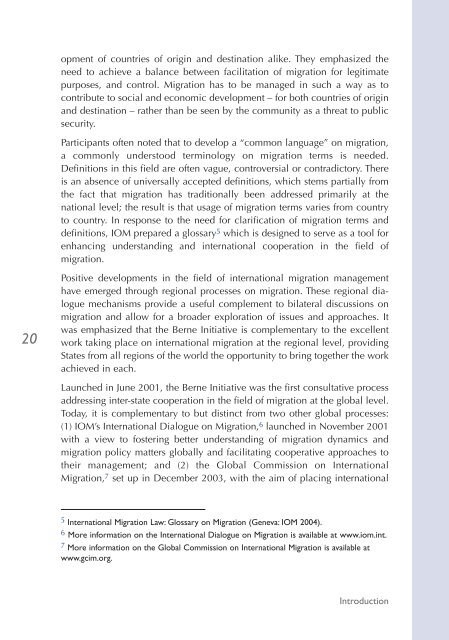Chapitre III - UNITAR
Chapitre III - UNITAR
Chapitre III - UNITAR
You also want an ePaper? Increase the reach of your titles
YUMPU automatically turns print PDFs into web optimized ePapers that Google loves.
20<br />
opment of countries of origin and destination alike. They emphasized the<br />
need to achieve a balance between facilitation of migration for legitimate<br />
purposes, and control. Migration has to be managed in such a way as to<br />
contribute to social and economic development – for both countries of origin<br />
and destination – rather than be seen by the community as a threat to public<br />
security.<br />
Participants often noted that to develop a “common language” on migration,<br />
a commonly understood terminology on migration terms is needed.<br />
Definitions in this field are often vague, controversial or contradictory. There<br />
is an absence of universally accepted definitions, which stems partially from<br />
the fact that migration has traditionally been addressed primarily at the<br />
national level; the result is that usage of migration terms varies from country<br />
to country. In response to the need for clarification of migration terms and<br />
definitions, IOM prepared a glossary 5 which is designed to serve as a tool for<br />
enhancing understanding and international cooperation in the field of<br />
migration.<br />
Positive developments in the field of international migration management<br />
have emerged through regional processes on migration. These regional dialogue<br />
mechanisms provide a useful complement to bilateral discussions on<br />
migration and allow for a broader exploration of issues and approaches. It<br />
was emphasized that the Berne Initiative is complementary to the excellent<br />
work taking place on international migration at the regional level, providing<br />
States from all regions of the world the opportunity to bring together the work<br />
achieved in each.<br />
Launched in June 2001, the Berne Initiative was the first consultative process<br />
addressing inter-state cooperation in the field of migration at the global level.<br />
Today, it is complementary to but distinct from two other global processes:<br />
(1) IOM’s International Dialogue on Migration, 6 launched in November 2001<br />
with a view to fostering better understanding of migration dynamics and<br />
migration policy matters globally and facilitating cooperative approaches to<br />
their management; and (2) the Global Commission on International<br />
Migration, 7 set up in December 2003, with the aim of placing international<br />
5 International Migration Law: Glossary on Migration (Geneva: IOM 2004).<br />
6 More information on the International Dialogue on Migration is available at www.iom.int.<br />
7 More information on the Global Commission on International Migration is available at<br />
www.gcim.org.<br />
Introduction
















